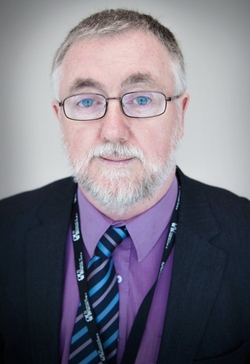
A continued evolution of technology and teaching methods will shape medical education for the next generation of physicians, according to a “cornerstone” OUWB faculty member who is retiring.
Stephen Loftus, Ph.D., associate professor, Department of Foundational Medical Studies, retires effective July 1. He used a special virtual event held June 9 to reflect on his career in medical education while projecting future trends.
Loftus joined Oakland University William Beaumont School of Medicine in November 2013 as associate professor. He has been responsible for faculty development and was also involved in a number of courses, especially medical humanities and Embark research projects.
Douglas Gould, Ph.D., chair, Department of Foundational Medical Studies, reflected on the impact Loftus has had on OUWB.
“Dr. Loftus...has been instrumental in making (the Department of Foundational Medical Studies) into a group of card-carrying master educators,” said Gould.
Gould added that Loftus is “a prolific author on medical education and has been the cornerstone of the OUWB medical education certificate program and the fellowship in medical education programs.”
“Dr. Loftus' impact on OUWB will last for generations and his influence on medical education will be dearly missed.”
Loftus said he hopes to have helped raise awareness on the complexity of medical education. He added that he chose OUWB because it was a new school open to new ideas.
“It was a fairly new medical school, I knew they would be more open to try new ideas,” Loftus said. “That was part of it; to be pioneering and innovative.”
Med ed reflections, projections
A dental professional with more than 20 years in medical education, Loftus developed an internationally recognized inter-professional online graduate course in pain management at Sydney University.
His research on clinical reasoning has appeared in several journals and books, such as the well-received, “Clinical Reasoning in the Health Professions.” He has also supervised doctoral research students at Charles Sturt University in Australia, in topics such as clinical reasoning, higher education, and clinician/patient relationships.
Loftus said he started his journey in the dental field but did not see himself as a surgeon. It wasn’t until he discovered the CD-ROM he fell in love with not only computers but the future of educational technology.
| More from OUWB |
Founding director of OUWB’s medical library steps down from ‘dream job’ Venuti retires from Oakland University William Beaumont School of Medicine |
“My first job after graduation was to go to the University of London and head up a small team that was developing computer-based tutorials for medical and dental students,” Loftus said. “And I found the whole thing absolutely fascinating. I had to learn and teach myself how to do instructional design. And while I was there, the World Wide Web came along.”
Loftus said he thinks there will be a lot more educational technology in medical education, and stated that he thinks people oversimplify medical practices by seeing it as knowing science and how to apply it.
“There's going to be a lot more integration. I'd like to see this: a bigger trend towards case-based learning, problem-based learning, team-based learning, more small group learning and interaction. I think that they're powerful opportunities for the students to really learn what they need to learn,” Loftus said.
To better prepare students to take their own role in their education, he said that OUWB must market new techniques to them such as case-based learning, where the approach will help them apply what they learn in the classroom when meeting with patients. In addition, he said there needs to be a shift from a two-plus-two curriculum to one that is more integrated.
“A case-based learning approach and a problem-based learning approach helps them do that right from the start,” he said.
Reflecting back on his time at OUWB, Loftus added that he was very impressed with the medical humanities and clinical bioethics course, saying it is “one of the best I've seen in the world.”
“I’ve really enjoyed the clinical and educational environment. I enjoyed learning more about the medical practice,” he added. “[OUWB has] been a great place and a very friendly place… it is supportive and encouraging.”
To request an interview, visit the OUWB Communications & Marketing webpage.
NOTICE: Except where otherwise noted, all articles are published under a Creative Commons Attribution 3.0 license. You are free to copy, distribute, adapt, transmit, or make commercial use of this work as long as you attribute Oakland University William Beaumont School of Medicine as the original creator and include a link to this article.

